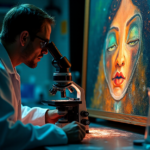At the forefront of biological science, synthetic biology is the field where engineers create new biological components or systems or modify current ones for practical uses. From building biofuels from bacteria to inventing plants that illuminate when they need water, this article will walk you through amazing uses. My own visit to a synthetic biology lab let me see a future in which we might program creatures akin to our own computers. The paper addresses moral issues, possible hazards, and the countless possibilities this discipline offers. We investigate how synthetic biology might address some of the toughest problems confronting society by combining personal curiosity with professional interviews.
Table of Contents
- From Concept to Reality: Exploring the World of Synthetic Biology
- Applications of Synthetic Biology
- Ethics and Future Prospects of Synthetic Biology
- Extra’s:
From Concept to Reality: Exploring the World of Synthetic Biology

Have you ever considered inventing your own bacteria? Alternatively perhaps you have dreamed of designing a plant that shines in the darkness. These are just a handful of the astonishing opportunities synthetic biology presents! This field mixes bioengineering with gene editing to produce creative answers for many different kinds of problems.
Synthetic biology aims to radically alter how life functions rather than only produce new organisms. Consider it like programming computers, except instead of lines of code we are dealing with the genetic blueprint of life. Imagine a time when we might create disease-resistant plants or engineer microbes to generate pure energy from waste products. Could we perhaps design plants capable of pollution cleanup? The opportunities are really very unlimited!
Transforming Industries with Synthetic Biology
Already, synthetic biology is making major advancements in several spheres. Scientists are developing crops more resistant to pests and diseases, for instance, by use of gene editing approaches. This lowers dependability on pesticides and boosts food output. Imagine a time when you could create plants that generate their own pesticides, therefore negating the necessity for dangerous poisons. Within the field of medicine, synthetic biology is creating fresh treatments for HIV and cancer. Companies like Caribou Biosciences, for example, are creating fresh cancer medicines utilizing gene editing. Recall that utilizing CRISpen-Cas9, scientists were able to remove a genetic abnormality in a baby suffering from a life-threatening cardiac condition? Imagine now that same technology is helping to treat HIV and cancer among other illnesses. Synthetic biology is already clearly showing influence.
Addressing the Ethical Landscape of Synthetic Biology
Although synthetic biology offers fascinating opportunities, we should give great thought to the possible hazards involved in producing new species. Suppose a genetically altered organism were unintentionally let loose into the wild? It could have unanticipated effects. The possibility for synthetic biology, including the development of biological weapons, raises still another issue. We must have honest conversations about these ethical issues and create well defined policies for development of research and technologies. Let us ensure that everyone benefits from this great technology. Our hands hold the future of this great technology; it is up to us to guarantee responsible use of it.
Applications of Synthetic Biology

Combining bioengineering with genetic design, synthetic biology is a fast developing discipline offering fresh answers for a variety of problems. It’s really about re-engineering the building blocks of life. We are opening hitherto unthinkable opportunities by changing and controlling living systems.
Transforming Industries with Synthetic Biology
Synthetic biology might transform many different sectors. Imagine, for instance, a time when plants are developed to create their own pesticides, therefore removing the need for outside chemical treatments. Though scientists are already developing crops more resistant to pests and diseases using genetic design, this could sound like science fiction. This not only raises crop yields but also lessens the demand for dangerous pesticides, therefore improving the environment and human health.
Bioengineering: The Foundation of Synthetic Biology
Synthetic biology depends much on bioengineering. It entails using engineering ideas to biological systems so that we may create fresh biological parts, tools, and systems. Using bioengineering, for example, researchers are producing genetically modified microorganisms capable of manufacturing valuable goods such medications and biofuels. By means of their metabolic pathways, these microbes function as little factories synthesizing various compounds.
The Ethical Landscape of Synthetic Biology
Synthetic biology raises ethical questions even if it offers great possibilities. The unexpected results of genetic engineering raise one of the main issues. For instance, the introduction of genetically modified organisms (GMOs) into the surroundings begs issues concerning possible effects on the ecology. Suppose these genetically modified organisms unexpectedly contact with native species. Is this likely to cause disturbance of ecosystems?
Still another ethical conundrum is the possibility for abuse. Might biological weapons be produced via synthetic biology? We really should take early attention to these issues. Clear rules and regulations will help us to guarantee that this great technology is applied for good and open and honest debates on the ethical consequences of synthetic biology will help us as well.
Biofuel Production through Synthetic Biology
Furthermore helping greatly in the creation of sustainable biofuels is synthetic biology. Many times derived from food crops, traditional biofuels such as ethanol raise questions around land usage and food security. Synthetic biology, however, lets researchers create biofuels from a greater variety of sources—such as algae or agricultural waste—by engineering microbes. This lessens dependence on food crops and provides a more sustainable substitute for fossil fuels as well. For instance, Joint BioEnergy Institute (JBEI) researchers have created genetically modified algae capable of generating large volumes of biofuel, therefore transforming the energy sector.
The Future of Synthetic Biology
Synthetic biology’s future seems to be really promising. From food security and energy generation to illness treatment and environmental preservation, it might help with some of the most urgent problems facing the planet. With many more innovative uses just ahead, this technology is already having an impact. A ground-breaking gene-editing tool, CRISpen technology has made genetic engineering more exact and quick than it ever has. Using CRISpen, scientists are creating fresh treatments for diseases including cancer and HIV as well as investigating its possibilities for treating hereditary conditions.
Conclusion
For some of the most urgent problems facing the planet, synthetic biology shows amazing promise. Though it’s a useful instrument, enormous power comes with great responsibility. We have to give ethical issues and responsible development top priority as we advance so that this transforming technology may be applied for the advantage of all. Open communication, well defined policies, and scientific cooperation among ethicists, legislators, and scientists will help us to maximize synthetic biology’s possibilities while minimizing any hazards.
Ethics and Future Prospects of Synthetic Biology

Imagine a time when we might create organisms capable of curing hereditary diseases, generate biofuels from algae, and clean up pollutants. With synthetic biology, a discipline where researchers employ bioengineering to produce fresh answers for some of our most pressing concerns, promises are Though it’s a great technology that could improve our planet, it also begs serious ethical concerns. Today we will examine the ethical terrain of synthetic biology and go over its exciting potential directions.
The Ethical Side of Synthetic Biology
Synthetic biology begs several serious issues regarding our capacity to control life at its fundamental level. Suppose we let a genetically modified organism (GMO) flourish wild? Would it beat natural species? Could it disseminate invasive genes? These are only a handful of the issues we should give some thought before we begin bringing genetically modified organisms into natural environments. Before releasing any genetically modified organisms into the wild, we must exercise great care and complete ecological studies.
An other main ethical issue is the possibility of abuse. Suppose synthetic biology is applied to produce highly contagious and resistant infections, biological weapons? Human health as well as world security could be seriously threatened by this. Research and development in synthetic biology must be carried out ethically, with rigorous protections in place to stop the exploitation of this potent tool.
The Promise of Synthetic Biology
Though there are ethical questions, synthetic biology has bright future prospects. Examining a broad spectrum of uses that might transform sectors including medicine, agriculture, and energy, bioengineers are
Revolutionizing Food Production
Crops more resistant to pests, diseases, and hostile environmental conditions are being developed using genetic design. Rising yields and more environmentally friendly farming methods could follow from this. One African farmer I spoke with, for instance, told me how growing drought-resistant corn helped him to negotiate difficult conditions. This is only one instance of how synthetic biology is helping to guarantee food security.
Redefining Medicine
By developing fresh treatments for diseases including cancer and HIV, synthetic biology is revolutionizing medicine. With their exact DNA modification ability, CRISpen gene-editing tools present the possibility to heal hereditary diseases. For sickle cell anaemia and cystic fibrosis, for instance, scientists are creating treatments using CRISpen. Thanks to developments in synthetic biology, medicine’s future seems to be brighter.
Sustainable Energy
Working to increase biofuel production sustainability and efficiency are bioengineers. By means of biofuels produced from algae, we can lessen reliance on fossil fuels. Actually, scientists are looking at algae as a sustainable biofuel source rather aggressively.
Cleaning Up Our Environment
Development of pollution-cleansing organisms can be accomplished with synthetic biology. For contaminated soil or water, for instance, microbes can be created to degrade harmful substances. Imagine a time when specially designed microbes will help us to clean up oil spills. This is only one instance of how synthetic biology might help to preserve our planet.
A Path Towards Responsible Innovation
We must act responsibly and ethically if we are to fully utilize synthetic biology and solve ethical issues. This implies encouraging honest communication and cooperation among scientists, ethicists, legislators, and the general people. Following these guidelines will help us:
- Transparent Research and Development: We need to ensure the public understands the potential risks and benefits of synthetic biology research. We can do this by sharing information openly and honestly.
- Robust Regulation and Guidelines: Clear regulations and guidelines must be established for the development and use of synthetic biology technologies. These regulations must be designed to protect human health and the environment.
- International Collaboration: International cooperation is vital to ensure that synthetic biology is developed and used responsibly. By working together, we can share best practices and develop a global framework for ethical synthetic biology.
From food security to climate change, synthetic biology could enable us to solve some of the toughest issues facing the planet. We have to make sure everyone gains from this transforming technology. Synthetic biology will be ours to shape. We have to guarantee responsible and sensible use of it.
Extra’s:
For those interested in learning more about the intricate relationship between humans and the animal kingdom, especially in relation to infectious diseases, “Zoonotic Diseases: How Animal Infections Can Jump to Humans” explores the fascinating world of zoonotic diseases, explaining how infections can jump from animals to humans and the implications for global health. For a deeper dive into the mechanisms by which our lifestyle influences our genetic expression, “How Your Lifestyle Shapes Your Genes: The Epigenetics Revolution” delves into the field of epigenetics, revealing how environmental factors can alter gene activity without changing the underlying DNA sequence.
For a more in-depth look at the practical applications of synthetic biology, “Applications of synthetic biology in medical and pharmaceutical fields | Signal Transduction and Targeted Therapy” provides a comprehensive overview of its potential in revolutionizing medical treatments. This article examines how synthetic biology can be used to develop novel therapies for a wide range of diseases, highlighting its potential to address unmet medical needs.












1 thought on “Engineering Life: The Innovations of Synthetic Biology”